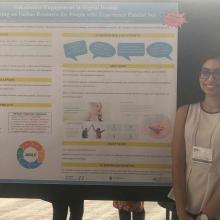Kiran Parmar
Why did you decide to pursue a graduate degree?
In the final year of my undergraduate degree studying Microbiology and Immunology, I had noticed that despite there being an extensive biological knowledge base for the control of infectious diseases, there were many barriers that prevented the translation of that knowledge to the reduction of morbidity and mortality. I had taken a public health course in that same undergraduate year to learn about population level determinants to long-term health and well-being. I connected the two disciplines and decided to pursue a graduate degree to gain experience forming and articulating my own research questions to describe population barriers to the control of communicable diseases at a local and global level.
Why did you decide to study at UBC?
The University of British Columbia is nationally and internationally recognized for its excellence in research and its impact in addressing global issues. British Columbia is my home and I am very fortunate to have the access to study at an institution dedicated to leading cutting edge research to improve human health and medicine.
What is it specifically, that your program offers, that attracted you?
I decided to pursue a graduate degree at UBC’s School of Population and Public Health to gain the epidemiological and biostatistical skills needed to complete population health research. This program allows me to combine my multiple research interests such as infectious diseases, women’s sexual and reproductive health and implementation science into a master’s thesis. I am also very fortunate to be working with Dr. Gina Ogilvie, Dr. Beth Payne and other expert researchers from the Global Control of HPV Related Diseases and Cancer team whose work is embedded in the public health system.
What was the best surprise about UBC or life in Vancouver?
The best surprise about UBC is the sheer breadth of disciplines and opportunities available for students to explore and pursue. During my undergraduate studies, I was able to enroll in different courses outside of my major - one such being public health - that inspired me to pursue graduate studies. I was able to complete a full year working at an established laboratory through the co-operative education program and have hands-on experience in preclinical drug development for cancer immunotherapy. Further, through UBC’s Work Learn program, I have had the opportunity to work in a clinical research setting that inspired me to pursue the field of women’s health research.
What aspect of your graduate program do you enjoy the most or are looking forward to with the greatest curiosity?
My favourite part of this graduate program is being able to combine my background in immunology and my passion for women’s health to complete research with the goal of improving health outcomes on a global scale. I also enjoy applying concepts learned in a classroom to a real world research setting and seeing how my education is being used to inform meaningful change. I look forward to becoming a published researcher and seeing the translation of my work.
What aspects of your life or career before now have best prepared you for your UBC graduate program?
Besides my undergraduate education, my role as a research assistant at BC Women’s Centre for Pelvic Pain and Endometriosis best prepared me for my UBC graduate program. I started this position when I graduated from my undergraduate studies in May 2019 and it was my first experience working in a clinical research setting in the field of women’s health research. I have been lucky to work with the team’s research manager, Heather Noga, and the principal investigators Dr. Fuchsia Howard and Dr. Paul Yong on knowledge translation and patient-oriented research projects. The position has given me the opportunity to learn about the groundwork of clinical and translational research. Working at the women’s health research institute with this team inspired me to complete my master’s thesis in the field of women’s reproductive health.
What advice do you have for new graduate students?
To reach out and connect with multiple professionals in the field of your research interest! It might take some time to determine what you specifically want to study and it is important during that time to network to learn about the work that is currently happening. It is also beneficial to take some time to reflect on what you would like to pursue after graduation so that you can align your graduate studies with your career goals. Also, graduate studies can get challenging, it is very important to maintain a balanced lifestyle!
Learn more about Kiran's research
Sexual, reproductive and maternal health issues remain the leading causes of morbidity and mortality among adolescent girls in Uganda. Pregnant adolescents and their infants, together, represent one of the highest risk populations and I plan to explore factors related to the access and uptake of maternal and reproductive healthcare services. I will also describe key health outcomes and risk factors in both the adolescents and their infants. In collaboration with researchers in Uganda, I will use the data from this study to design strategic interventions to increase access and uptake of reproductive and sexual healthcare services including the HPV vaccine among this vulnerable population.

